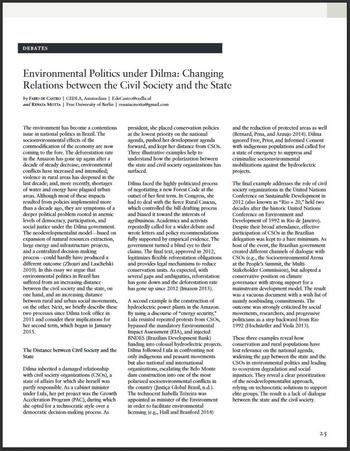Environmental Politics under Dilma: Changing Relations between the Civil Society and the State
Fabio de Castro & Renata Motta – 2015
The environment has become a contentious issue in national politics in Brazil. The socioenvironmental effects of the commodification of the economy are now coming to the fore. The deforestation rate in the Amazon has gone up again after a decade of steady decrease; environmental conflicts have increased and intensified; violence in rural areas has deepened in the last decade; and, more recently, shortages of water and energy have plagued urban areas. Although most of these impacts resulted from policies implemented more than a decade ago, they are symptoms of a deeper political problem rooted in anemic levels of democracy, participation, and social justice under the Dilma government. The neodevelopmentalist model—based on expansion of natural resources extraction, large energy and infrastructure projects, and a centralized decision-making process—could hardly have produced a different outcome (Zhouri and Laschefski (2010). In this essay we argue that environmental politics in Brazil has suffered from an increasing distance between the civil society and the state, on one hand, and an increasing distance between rural and urban social movements, on the other. Next, we briefly describe these two processes since Dilma took office in 2011 and consider their implications for her second term, which began in January 2015.
